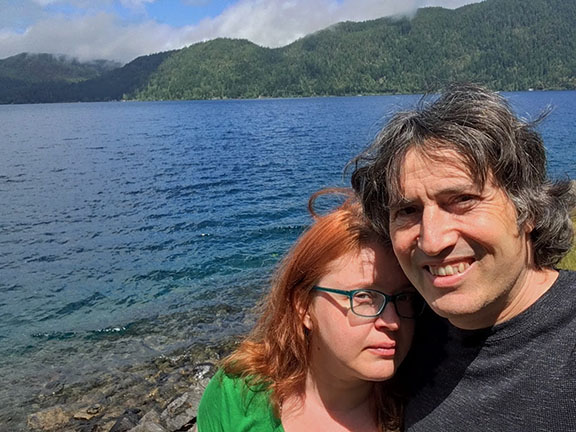By Eileen Moon
Red Bank residents David and Nathalie Halbout once had dreams of retiring to Nathalie’s native city of Kyiv.
Since Feb. 24, when Russia launched its attack on Ukraine, that dream has receded into the background as the French-Ukrainian couple marshal every possible resource at their disposal to bring Nathalie’s family safely out of Kyiv and deliver medical and military supplies for those remaining in Ukraine.
On March 8, Nathalie traveled to Prague, carrying some 250 pounds of clothing and medical supplies which she delivered to a distribution network working at the Ukrainian border.
She is still in Prague, where her niece Maiia, 30, arrived after a treacherous, four-day journey pieced together by Nathalie and David a world away in Red Bank.
Now, Nathalie and David are organizing a plan to get Nathalie’s sister Alla, 60, a diabetic who uses a wheelchair, Alla’s husband Vladimir, who is 82, and three elderly family friends across the border.
Recent images from media coverage of the war showing a blast of fire in an apartment building were horrifyingly familiar to Nathalie and David – the building hit in that bombing is only 300 yards from the one Nathalie’s family lives in. The family apartment, on the west side of the city, no longer has windows.
Nearby subway lines are no longer running; they’ve been transformed into bomb shelters. The city is under martial law, meaning that movement is restricted; residents are allowed on the street only at certain times or with special permission.
There are no more buses. Taxis are in desperate demand and those who are lucky enough to find a driver willing to brave the bombings pay 10 times the former rate for every harrowing journey.
In the snowy, bitter winter, sirens blare and bombs fall, and those who can, take shelter where they find it, in basements and metro stations.
“There is a lot of misery in my wife’s and her family’s life right now,” David said. “She is totally overwhelmed.”
A sound engineer and custom furniture designer who teaches in the School of Art and Design at New York’s Fashion Institute of Technology, David met the former Nathalie D’Iris while traveling in France many years ago.
Friends at first, they became a couple many years later and have been married for the past 11 years, settling in Red Bank.
David is a native of Normandy, born in the city of Caen, where the Allies battled the Germans and American tanks rolled into the streets during the D-Day invasion of June 1944.
Nathalie grew up in Kyiv, a city David likens to Paris; a colorful, cultural and historic place on the banks of the Dnieper River.
In the shade and sun of summer, it is a place full of life, a city with its own Montmartre, full of music and creativity.
Today that city is a place of terror and death and destruction.
Nathalie, a textile designer who employs natural fabrics like linen and cotton and makes her own dyes from flowers and plants, is also a psychiatric nurse who worked at Riverview Medical Center for 20 years.
She and David always looked forward to their trips back to Kyiv, where they had a wide circle of family and friends, enjoying the life of a city whose cafes, museums, opera house, dancing and music in the public squares belied the dark history of war and the grim years of Russian occupation.
As the news of approaching conflict grew ominous in late February, they turned to their friends in the Ukraine for help in arranging a way to bring Nathalie’s family to safety, asking about the best escape routes; what was working; what was possible; who could help.
With the war on her family’s doorstep, Nathalie began making plans. “She is fierce,” David said. “She wants to help people.”
“For 10 days, we didn’t sleep,” he continued. With cellphone and internet service unreliable, they developed alternative communication links through unfamiliar apps, arranging certain times to connect so Nathalie’s family and their friends could conserve their phone batteries.
On a recent morning at 2 a.m. Ukraine time, they managed to get an early morning ride for Maiia, Nathalie’s niece, to the train station.
When she arrived, the crowd surging toward the train was so large that police had to shoot into the air to keep it under control.
But before anyone could board the train, the sirens sounded, and the crowd stampeded from the platform to find shelter before the bombs began to fall.
Maiia – and David and Nathalie – were back to square one, trying to find a taxi for her to the station, working on Maiia’s way out once again.
Days later, after many twists and turns, each one carrying the potential for tragedy, Maiia arrived in Bratislava, the capital of Slovakia. Her brother drove from Prague to pick her up. The 200-mile trip took more than seven hours.
Now, the Halbouts are attempting to cobble together a plan to bring the rest of the family to safety.
Because Nathalie’s family is Jewish, David has reached out to some local contacts with connections to Jewish organizations who are engaged in the effort to bring refugees to safety.
It is a costly and dangerous journey, particularly considering the family’s health issues.
“We are just hoping they are going to be able to make it,” David said.
As millions of refugees cross the borders of Ukraine, it has become near impossible to find any housing for rent, David said. More than 100,000 Ukrainian refugees have sought shelter in the Czech Republic alone.
The Halbouts were fortunate Nathalie’s brother Matteu moved from a one-bedroom apartment to a three-bedroom house in Prague not long before the Russian invasion of Ukraine. If they are successful in getting the rest of the family out, David said, they will have a home in Prague. If it is possible, David and Nathalie would like to bring Maiia, who speaks five languages, here to live with them.
Right now, David is busy collecting medical and military gear to take along when he travels to Prague March 21. He is gladly accepting donations to help with the cost of purchasing the needed items, much of which has been specifically requested. “These are things to save a life,” he said.
Because it is literally a matter of life and death, David is planning to bring only those things that are specifically needed or requested when he leaves next Tuesday.
“We are in contact with the 24th Battalion (Ukraine). They are fighting in Luhansk,” he said.
Many Ukrainian soldiers are ill-equipped, he noted. “Some of the soldiers don’t have boots or bulletproof vests.”
He is also purchasing military-grade night vision goggles. “These cost a lot of money,” he said. “They are not a toy.”
With recent donations, he has been able to purchase 12 pairs of military boots and an assortment of tactical vests, night binoculars, gloves, tourniquets and other needed items totaling more than $2,500.
Before Nathalie left last week, Jersey Shore Pediatrics donated medical supplies and many local friends have contributed to the Halbouts’ efforts as well.
The couple has also spent more than $4,000 of their own money for wound care kits, tourniquets, ibuprofen and other needed items. They reached out to friends and co-workers to ask for help as well.
“We just did what we could,” David said. “It is merely a drop in the bucket, but it is still something that is meaningful.”
“I’m bringing anything I can – three huge bags of supplies.”
The couple, natives of nations that have risen from the destruction of other wars, is determined to do all they can to help Ukraine.
“We are facing not a small conflict,” David said. “We are facing something that is deeper. If we don’t stand now, we might have something even more serious.”
Donations to support the Halbouts’ efforts can be made via PayPal @DavidHalbout or through Venmo @David-Halbout.
The article originally appeared in the March 17 – 23, 2022 print edition of The Two River Times.















